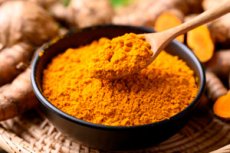New publications
Study shows antidepressant effects of curcumin in patients with obesity and type 2 diabetes
Last reviewed: 02.07.2025

All iLive content is medically reviewed or fact checked to ensure as much factual accuracy as possible.
We have strict sourcing guidelines and only link to reputable media sites, academic research institutions and, whenever possible, medically peer reviewed studies. Note that the numbers in parentheses ([1], [2], etc.) are clickable links to these studies.
If you feel that any of our content is inaccurate, out-of-date, or otherwise questionable, please select it and press Ctrl + Enter.

In a recent study published in the journal Nutrients, researchers conducted a randomized clinical trial (RCT) to examine the effectiveness of curcumin in reducing depression among obese patients with type 2 diabetes (T2DM).
Type 2 diabetes is a chronic disease characterized by high blood glucose levels caused by dysfunction of pancreatic beta cells and decreased insulin action. It is a global public health problem with increasing incidence in wealthy countries.
Patients with T2DM are more likely to become disabled, lose their ability to work, or lose their jobs. T2DM also increases the likelihood of developing major depressive disorder (MDD), which leads to functional impairment and requires treatment.
T2DM and depression coexist bidirectionally, resulting in job loss, non-adherence to medical prescriptions, and increased mortality risks.
Antidepressants, the main treatment for MDD, can cause weight gain and worse cardiometabolic health. Curcumin, the main curcuminoid in turmeric, may reduce anxiety and depression; however, there are limited RCTs to support this.
In this double-blind, placebo-controlled RCT, researchers assessed the effect of curcumin in reducing depression among 227 obese patients with T2DM, focusing on the increase in serotonin levels due to curcumin's antioxidant and anti-inflammatory properties.
The researchers included individuals aged 35 years or older who had been diagnosed with T2DM within the previous year, with a body mass index (BMI) ≥23 kg/m2, glycated hemoglobin (HbA1c) below 6.50%, and fasting glucose below 110 mg/dL. Diabetes diagnosis was based on the 2017 American Diabetes Association (ADA) criteria.
After one year, curcumin users showed a significant reduction in depression severity, as evidenced by a 20% improvement in the PHQ-9 scale (compared to 2.6% in the control group), with increased serotonin levels and lower levels of IL-1β, IL-6, and TNF-α compared to placebo recipients. The anti-inflammatory properties of curcumin extracts may increase serum serotonin levels.
The study found that curcumin was effective and safe in reducing the severity of depression in obese patients with T2DM.
Curcumin may help relieve depression by increasing serotonin levels, reducing inflammation, and decreasing oxidative stress.
However, further research is needed to better understand the mechanisms of action of curcumin in obesity and establish dose-response relationships. Future studies should include more diverse populations to enhance the overall conclusions of the study.
